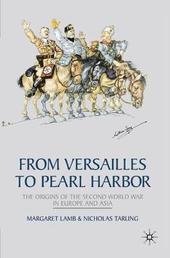
|
From Versailles to Pearl Harbor: The Origins of the Second World War in Europe and Asia
Hardback
Main Details
| Title |
From Versailles to Pearl Harbor: The Origins of the Second World War in Europe and Asia
|
| Authors and Contributors |
By (author) Margaret Lamb
|
|
By (author) Nicholas Tarling
|
| Physical Properties |
| Format:Hardback | | Pages:256 | | Dimensions(mm): Height 234,Width 156 |
|
| Category/Genre | World history
Second world war
Political economy |
|---|
| ISBN/Barcode |
9780333738399
|
| Classifications | Dewey:940.531 |
|---|
| Audience | | A / AS level | | Further/Higher Education | | Undergraduate | |
|---|
| Illustrations |
256 p.
|
|
Publishing Details |
| Publisher |
Bloomsbury Publishing PLC
|
| Imprint |
Red Globe Press
|
| Publication Date |
11 May 2001 |
| Publication Country |
United Kingdom
|
Description
In 1941 the European war became a world war. This book tackles that process in its economic, political and ideological dimensions. Margaret Lamb and Nicholas Tarling explore the significance of the Asian factor and the importance of East Asia in the making of the war in Europe and the transformation of the European war of 1939 into the world war of 1941. This Asian factor has often been neglected, but the policies of all the major powers were affected by their world wide interests. The global approach not only helps in explaining the causes of the war, it also helps to explain its nature and its outcome.
Author Biography
MARGARET LAMB was, before her retirement, Senior Lecturer of History at the University of Auckland, New Zealand. - NICHOLAS TARLING is Emeritus Professor of History at the New Zealand Asia Institute at the University of Auckland.
Reviews'Their book will be a valuable introduction to anyone coming to the subject for the first time, and even the best-informed reader will find something to think about.' - P.M.H. Bell, University of Liverpool '...this will attract attention both by its comprehensive character and its smooth writing style...it could be extremely useful in a wide variety of contexts.' - Journal of Military History 'I have rarely if ever read as lucid and comprehensive a survey. It fills a gap in the extensive secondary literature and makes a distinctive contribution of its own. I have enjoyed reading it, and shall recommend it as an essential text.' - Professor Geoffrey Martin, University of Essex '...students and faculty could profit from its adoption in a diplomatic history course.' - Russell D. Buhite, Journal of American History
|